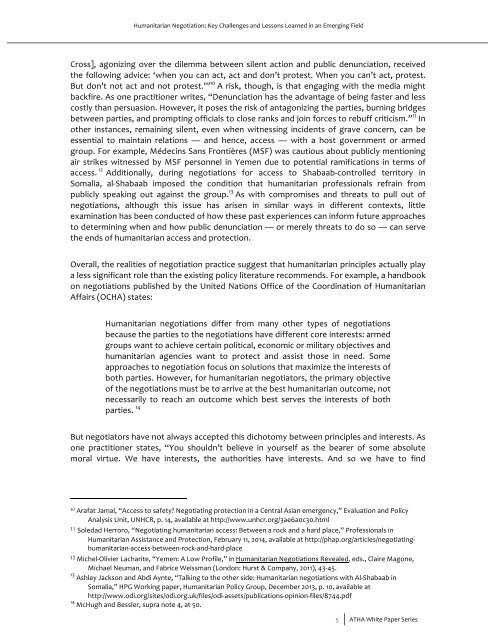LIEPe
LIEPe
LIEPe
Create successful ePaper yourself
Turn your PDF publications into a flip-book with our unique Google optimized e-Paper software.
Humanitarian Negotiation: Key Challenges and Lessons Learned in an Emerging Field Cross], agonizing over the dilemma between silent action and public denunciation, received the following advice: ‘when you can act, act and don’t protest. When you can’t act, protest. But don’t not act and not protest.’” 10 A risk, though, is that engaging with the media might backfire. As one practitioner writes, “Denunciation has the advantage of being faster and less costly than persuasion. However, it poses the risk of antagonizing the parties, burning bridges between parties, and prompting officials to close ranks and join forces to rebuff criticism.” 11 In other instances, remaining silent, even when witnessing incidents of grave concern, can be essential to maintain relations — and hence, access — with a host government or armed group. For example, Médecins Sans Frontières (MSF) was cautious about publicly mentioning air strikes witnessed by MSF personnel in Yemen due to potential ramifications in terms of access. 12 Additionally, during negotiations for access to Shabaab-‐controlled territory in Somalia, al-‐Shabaab imposed the condition that humanitarian professionals refrain from publicly speaking out against the group. 13 As with compromises and threats to pull out of negotiations, although this issue has arisen in similar ways in different contexts, little examination has been conducted of how these past experiences can inform future approaches to determining when and how public denunciation — or merely threats to do so — can serve the ends of humanitarian access and protection. Overall, the realities of negotiation practice suggest that humanitarian principles actually play a less significant role than the existing policy literature recommends. For example, a handbook on negotiations published by the United Nations Office of the Coordination of Humanitarian Affairs (OCHA) states: Humanitarian negotiations differ from many other types of negotiations because the parties to the negotiations have different core interests: armed groups want to achieve certain political, economic or military objectives and humanitarian agencies want to protect and assist those in need. Some approaches to negotiation focus on solutions that maximize the interests of both parties. However, for humanitarian negotiators, the primary objective of the negotiations must be to arrive at the best humanitarian outcome, not necessarily to reach an outcome which best serves the interests of both parties. 14But negotiators have not always accepted this dichotomy between principles and interests. As one practitioner states, “You shouldn’t believe in yourself as the bearer of some absolute moral virtue. We have interests, the authorities have interests. And so we have to find 10 Arafat Jamal, “Access to safety? Negotiating protection in a Central Asian emergency,” Evaluation and Policy Analysis Unit, UNHCR, p. 14, available at http://www.unhcr.org/3ae6a0c30.html 11Soledad Herroro, “Negotiating humanitarian access: Between a rock and a hard place,” Professionals in Humanitarian Assistance and Protection, February 11, 2014, available at http://phap.org/articles/negotiating-humanitarian-‐access-‐between-‐rock-‐and-‐hard-‐place12 Michel-‐Olivier Lacharite, “Yemen: A Low Profile,” in Humanitarian Negotiations Revealed, eds., Claire Magone, Michael Neuman, and Fabrice Weissman (London: Hurst & Company, 2011), 43-‐45. 13 Ashley Jackson and Abdi Aynte, “Talking to the other side: Humanitarian negotiations with Al-‐Shabaab in Somalia,” HPG Working paper, Humanitarian Policy Group, December 2013, p. 10, available at http://www.odi.org/sites/odi.org.uk/files/odi-‐assets/publications-‐opinion-‐files/8744.pdf 14 McHugh and Bessler, supra note 4, at 50. 5 ATHA White Paper Series



